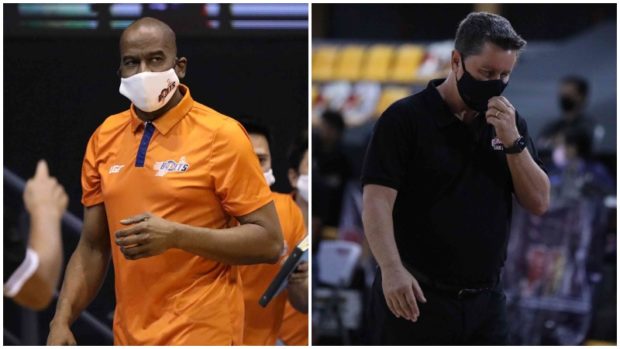No stopping talent exodus, but PBA chair wants live contracts honored

Meralco coach Norman Black (left) says seeing action overseas is a player’s choice, while Barangay Ginebra coach Tim Cone believes players must do what’s best for their families. —PBA IMAGES
There was a time when players who could not get into the PBA would take their talents overseas, sharpening their game, waiting for that chance to crack Asia’s first play-for-pay league.
That’s no longer the case.
A lot of young stars have made playing abroad their first choice—citing the potential to be better players while not denying reports that they are getting paid much more outside Philippine shores.
So many potential superstars have already signed pro contracts abroad without having played a single PBA game; trailblazer Thirdy Ravena, 7-foot-3 teenager Kai Sotto, Gilas Pilipinas standout Dwight Ramos and University of the Philippines star Kobe Paras. And then there are Kiefer Ravena and Ray Parks Jr., who already played in the PBA—Kiefer had a live contract even—when they opted to play overseas.
And the PBA has sounded the alarm, with chair Ricky Vargas ticked off by the fact that leagues overseas are tendering offers to PBA pros with live deals.
“This is an invasion and a disrespect to the league,” he said. “Just because you have more money to offer doesn’t mean you’re free to poach any player, right? Even in the private sector, there’s ethical standards on poaching.”
Short of contesting ethical breaches, however, there is little that the PBA can do to stop the exodus of players. The fact remains: It is a player’s right to seek employment where he can draw the most benefits.
“It doesn’t matter whether it’s personal development or monetary concerns, it’s still [a player’s] choice,” Meralco coach Norman Black told the Inquirer.
And that’s from the guy who believes the PBA is still one of the best leagues to improve one’s game.
“Talent-wise, the PBA is as competitive if not more competitive than the Korean Basketball League and Japan B.League,” said Black. “I say that because I’ve actually watched the games in both countries.”
Vargas agrees, saying players leave mainly for the money.
“I don’t think they are improving themselves [overseas] since they’re being imported into countries that need their skills,” he told the Inquirer. “So it’s not improving themselves—it’s actually purely for economic reasons.”
There is truth there. However, there is much to say about the league’s playing environment. Talent is heavily concentrated among six teams belonging to two major conglomerates that since the 2004 Fiesta conference, only one tournament featured a championship series without any of those six squads. One out of 42 conferences.
The league truly needs to look for ways to make itself enticing for local standouts without having to dole out sinful amounts of cash. And Vargas is aware of that and the need for the PBA to go with the current flow.
“I think the PBA has recognized this already. That because of the demand for our talent … we will have competition from Taiwan, Korea and Japan,” Vargas said.
“And we’ve allowed that. We’ve made the rules a bit more lax,” he added, citing the case of Kiefer Ravena, who the PBA freed from his contract so he could play in Japan.
Vargas said Kiefer was granted a reprieve because he committed an honest mistake. But in doing so, the PBA doesn’t want Kiefer’s case to be a precedent for players still under contract.
“Our only plea is if you sign a [PBA] contract, don’t renege on that contract because you already made a commitment,” Vargas said.
And conversely, Vargas is hoping that foreigners do not tender offers to PBA players with live deals.
“It is with great difficulty [to stop players from leaving] if they have no contract. But if they have a contract, can these foreign leagues just please respect those contracts?”
Barangay Ginebra coach Tim Cone, the league’s only two-time Grand Slam mentor, says he wouldn’t want to be a hurdle for players who wants to play overseas. But he would rather they stay home.
“Obviously, as a coach, you always want the player to do what is best for him and his family,” Cone told the Inquirer. “And if he has a better situation elsewhere, then you encourage him to go.”
“On the other hand, as a coach in the PBA, you are always concerned for the health of the league,” Cone added. “And you don’t want a grand exodus of talented players. That certainly would hurt the league.”
In the meantime, the league will survive.
“The PBA has always proved to be resilient over the years and I believe they will navigate their way through this issue,” Cone said.
But to keep up with the times, the PBA needs to do more than just survive. INQ
